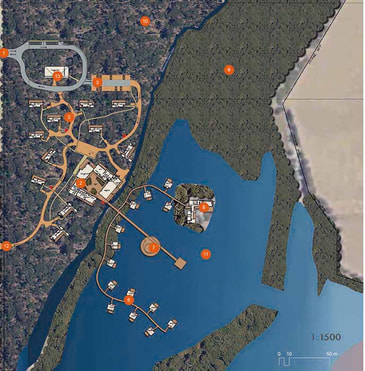 Illustration by Urbis for Sunshine International Group
Illustration by Urbis for Sunshine International Group AN “eco-tourism retreat” proposed for a degraded farm site in Ventnor will be a test of Bass Coast’s new rural tourism strategy.
The $8 million plan, proposed by the Sunshine International Group PL, is aimed at Chinese tour groups with accommodation for 96 guests in a mix of units, houses, cabins and elevated tents, plus an information centre, restaurant and swimming pool.
The vacant 36-hectare site at 115 Kitty Millers Bay Road, on the corner of Back Beach Road, is only a couple of kilometres from the Penguin Parade.
A key guiding document for the strategy was the Phillip Island Visitor Economy Strategy which highlights tourism product gaps that would be suited to rural areas, such as regional food and wine experiences, ecological and luxury accommodation with restaurant, spa and wellness experiences, rural retreats and farm or rural tourism experiences.
With the proposed Ventnor development likely to encounter local opposition, the council’s response will give a strong indication of how it might treat similar tourism proposals.
The Ventnor development proposal explicitly refers to the strategy, noting the resort would capture new tourism activities as the Victorian tourism market recovers from the coronavirus pandemic.
“The unique style of accommodation and associated facilities will extend Phillip Island’s draw beyond Melbourne beach-goers. The intention to cater to Chinese tour groups may promote the region to a wider market and lengthen the stay of visitors, many of whom only come for a day trip currently. Tapping into international markets is a key objective of the local Council.”
The proposal is marketed as an eco retreat incorporating boardwalks and viewing platforms extending out into the wetlands, which are proposed to be rehabilitated and re-vegetated as part of the development.
Much of the site is the man-made Kitty Miller Coastal Wetlands, which were excavated in the 1960s.
The developer proposes to regenerate these into a local attraction with boardwalks and viewing platforms. However nearby residents note that the wetlands are very saline and attempts at revegetation over the years have largely failed due to the salinity.